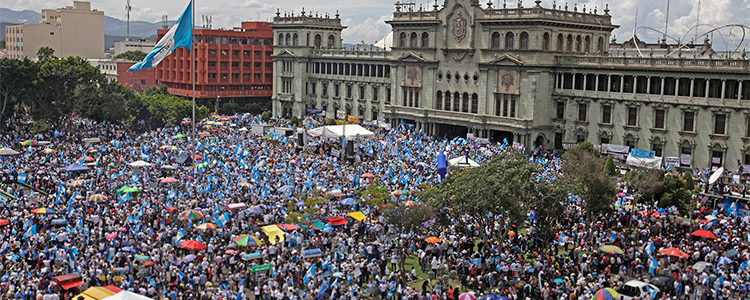
International Anti-Corruption Commissions in Central America’s Northern Triangle
Perhaps more than any other region in the world, the countries of Central America’s Northern Triangle (Guatemala, Honduras and El Salvador) face enormous internal challenges in regards to the fight against corruption and impunity. However, against all odds, the International Commission Against Impunity in Guatemala (CICIG), which was installed in 2007 under sponsorship of the United Nations, has been able to not only endure through four extension cycles (2009, 2011, 2013, and 2015), but to independently pursue cases of corruption involving actors as important as former president Alfonso Portillo (2000-2004) and members of the Berger administration (2004-2008), and even become the driving force behind the arrest of president Otto Pérez Molina.
The impact of the CICIG in Guatemalan politics has greatly inspired civil society across the region, fostering the creation of the Mission of Support against Corruption and Impunity in Honduras (MACCIH), sponsored this time by the Organization of American States (OAS). Similarly, the second half of 2015 saw opposition parties and civil society in El Salvador raise demands for the creation of an international anti-corruption commission (a “CICIES”) fashioned after the Guatemalan experience; so far, however, the government of president Sánchez Cerén have managed to resist demands, refusing to give in to domestic and international pressure.
The emergence of the above international anti-corruption commissions in Guatemala and Honduras posits a necessary question: How were the CICIG and the MACCIH allowed to emerge in political systems suffering from systemic corruption, and how do stakeholders influence their evolution? And, how were the initial conditions in Guatemala and Honduras different from the case of El Salvador, and what can this tells us about the future prospects for a CICIES?
The project aims to provide in-depth accounts of the political and social circumstances that prompted the creation of the CICIG and the MACCIH, but not of the CICIES; and, to identify the formal and informal challenges the first two commissions face from domestic actors vis-à- vis the support from national and international reformers in the fight against corruption. Through these accounts, the study shall be able to identify the sources of success and failure, weighting the relevance of structure and agency in each case. As a consequence of the analysis, the project also aims to provide a frame of reference to similar international efforts that are likely to be replicated in other regions of the developing world in the near future. Finally, the process of studying these international commissions shall allow for the development of a more thorough and detailed theoretical model, providing an important insight into the role of individual institutional actors in the evolution of national anti-corruption standards.
